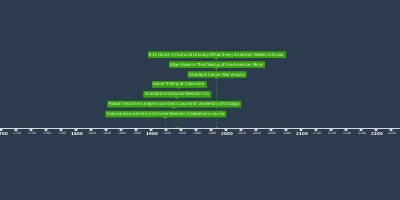Pearson College, Integrated Humaniaties at U Kansas (feb 12, 1971 – aug 4, 1979)
Description:
https://fundihpmemorial.org/ihp-history/John Senior
motto: Nascantur in admiratione (Let them be born in wonder)
Three founding professors: Dennis Quinn, Frank Nelick, John Senior.
Paul Coakley: “Our professors taught as if they believed there was a truth and that that truth was knowable.”
http://www.ncregister.com/site/article/where_wonder_cultivated_catholicity
Focused on transcendentals
Controversial and facing a death sentence from the start
From
Erin Doom, https://www.eighthdayinstitute.org/john_senior_defender_of_realism_and_professor_of_integrated_humanities, which quoted this from an original brochure:
What is the Person Integrated Humanities Program? It is three professors and two hundred students reading the great books of Western Civilization. It is a four-semester sequence of six credit hour courses designed especially for freshmen and sophomores. The first semester is devoted to ancient Greek authors, the second to Roman, the third to the Bible and Medieval civilization, and the fourth to the modern world. The books are selected to represent various areas of the humanities, especially history, literature, and philosophy. Instead of studying these three disciplines separately, they are considered in relation to each other and to the whole educational process. Students in the Program memorize poetry; they learn the script in which this booklet is written [calligraphy]; they waltz; they may speak Latin. The Program is open to all new K.U. students, and it is designed for all levels of academic ability, not just for “high achievers.” […] What is the Philosophy of the Humanities Program? It may be called “traditional” or “perennial” in so far as it follows the common understanding of reality which is handed down from Plato and the Bible, through the Christian Middle Ages and the Renaissance into our own times. This understanding has always been challenged, of course, and from the 16th century on, the attacks have grown sharper and more widespread. These challenges to the tradition are also studied in the Program, with a view to forming a just understanding of their force.The subject of the course is emphatically not the convictions of the teachers, for, as St. Augustine says, “Who would be so stupidly curious as to send his son to school in order that he may learn what the teacher thinks?” What Plato says is far more important than what we say of him, but it is not the point of education to learn even the convictions of Plato. The greatest of Plato’s students, Aristotle, declared that as much as he loved his teacher, he loved the truth still more. […] The spirit of the Pearson Program may be called Quixotic. Don Quixote has been both ridiculed and admired because he lived the chivalrous life when it was out of fashion. Note – he did not just talk about chivalry: he did it. As he took knight-errantry seriously, so we take Don Quixote seriously – and Odysseus, and all the others. Doing poetry is Quixotic – memorizing and reciting it; being mannerly and waltzing are Quixotic; and so is taking sides. Words like truth and faith and honor and love and courtesy and decency and simplicity and modesty are Quixotic, and the realities for which these words stand are, in this Iron Age, so Quixotic as to be positively despised by the sophisticated. The Pearson Program asserts that such realities are no sentimental “impossible dream,” no crazy anachronism, but rather the objects of an entirely possible dream which is the paradigm of sanity. Why Read the Great Books? On this question the judgment of Western Civilization is in. Not to know Homer and Plato and Virgil and Caesar and the Bible (to list no more) is simply to be uneducated. Merely to know about them is comparable to knowing about food without actually eating any. To know them in fragments is to be fragmentarily educated. It is worth repeating, however, that knowledge of books is not the aim of education. The books themselves aim at an understanding of the permanent things, the things which every person encounters in life. […]
Added to timeline:
Date:
feb 12, 1971
aug 4, 1979
~ 8 years and 5 months
